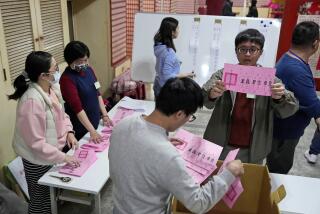Taipei Mayor Reaches Out to Ethnic Majority
- Share via
TAIPEI, Taiwan — He won the big election. Now, newly installed Mayor Ma Ying-jeou wants to prove that he can lead this Asian capital’s ethnic Taiwanese majority. His success or failure in this delicate matter could have far-reaching effects on the island’s political future.
On a recent morning, Ma attended an art exhibit at a memorial that commemorates thousands of native Taiwanese massacred by Nationalist troops in 1947 during riots sparked when an official beat an elderly island woman. The memorial has become a political rallying point for ethnic Taiwanese, who suffered through decades of martial-law rule under the Nationalists.
Later, during an interview at the futuristic City Hall here, the 48-year-old mayor talked about another pet project--producing textbooks to teach the Taiwanese dialect to the capital’s children, who are now instructed exclusively in Mandarin.
“In a city like Taipei,” said Ma, who speaks English with an American accent he picked up at New York University and Harvard Law School, “this language education has special meaning because quite a few local Taiwanese have kids who can’t even speak the dialect anymore and have trouble speaking fluent Taiwanese with their grandparents.”
These gestures are important because Ma is a mainlander--the son of Mandarin-speaking, mainland-born parents who came to the island after Nationalist forces lost control of China to the Communists in 1949. Although he has been studying the Taiwanese dialect for the past two years, Ma still speaks it only haltingly and is often ridiculed for this reason by native Taiwanese political opponents.
Since Taiwan began its much-celebrated democratic experiment a decade ago, the ruling Nationalist Party--known in Chinese as the Kuomintang, or KMT--has been largely reborn, with native Taiwanese such as President Lee Teng-hui and Prime Minister Vincent Siew elevated to top positions.
Now that Taiwan is a full-fledged democracy, the question remaining is whether prominent mainlanders in the party--such as Ma and James Soong, the former governor of Taiwan province--are still electable. About 80% of the island’s population is native Taiwanese, with mainlanders accounting for most of the rest. In Taipei, with nearly 3 million people, the population breakdown is about 60% Taiwanese and 40% mainlander.
By defeating a popular native Taiwanese incumbent, Chen Shui-bian, in last month’s crucial mayor’s race, Ma has shown that the electorate is willing to disregard ethnic backgrounds if voters are presented with a strong mainlander candidate. Ma was helped during his campaign by President Lee, who appeared at his side and proclaimed Ma a “new Taiwanese.”
Four years ago, Soong also defeated a native Taiwanese candidate, winning the governorship against his weak opponent.
Soong, who has taught himself to speak the Taiwanese dialect well, is a leading candidate for the 2000 presidential election, running either for the KMT or as an independent. A recent poll conducted by the Taiwan Public Research Foundation showed that 49% of the electorate would vote for Soong as president if he ran as an independent. His closest challenger in the poll was Chen, the former mayor, who won support of 25% of those polled.
Many here feel that Ma himself could be a potential candidate. However, first he must prove himself as mayor of Taipei, where major issues include 100,000 stray dogs, garbage collection and the fate of legal prostitution.
During the mayoral campaign, Ma published a brochure detailing his prowess as a long-distance runner and fitness buff. The brochure said Ma has logged more than 10,000 miles during 3,000 hours of running over 23 years. It announced that Ma does 50 push-ups and 70 sit-ups a day.
Fitness could be important in the early years of the young Taiwan democracy. On inauguration day last month, a fervent supporter of his defeated opponent attacked Ma with a campaign flagpole.
Even in this case, Ma exuded impressive tolerance and forgiveness, laughing off the attack.
His initial meetings with Taipei’s boisterous City Council, meanwhile, have been marked by challenges from its ethnic Taiwanese members.
“Some spoke to me only in Taiwanese dialect,” Ma said. “That was fine because I largely understood what they were saying. After four days of meetings, I think they all understood very well that I was the best person to achieve reconciliation on the ethnic question.”
When Ma presents himself to the public, he said, it is not as a “second-generation mainlander but as a first-generation new Taiwanese.”
More to Read
Sign up for Essential California
The most important California stories and recommendations in your inbox every morning.
You may occasionally receive promotional content from the Los Angeles Times.













